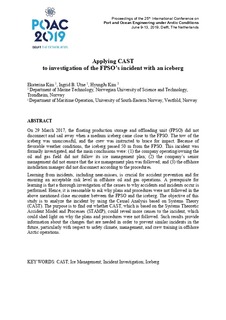Applying CAST to investigation of the FPSO’s incident with an iceberg
Journal article, Peer reviewed
Published version

View/
Date
2019Metadata
Show full item recordCollections
- Institutt for marin teknikk [3421]
- Publikasjoner fra CRIStin - NTNU [37737]
Abstract
On 29 March 2017, the floating production storage and offloading unit (FPSO) did not disconnect and sail away when a medium iceberg came close to the FPSO. The tow of the iceberg was unsuccessful, and the crew was instructed to brace for impact. Because of favorable weather conditions, the iceberg passed 50 m from the FPSO. This incident was formally investigated, and the main conclusions were: (1) the company operating/owning the oil and gas field did not follow its ice management plan; (2) the company’s senior management did not ensure that the ice management plan was followed; and (3) the offshore installation manager did not disconnect according to the procedures. Learning from incidents, including near-misses, is crucial for accident prevention and for ensuring an acceptable risk level in offshore oil and gas operations. A prerequisite for learning is that a thorough investigation of the causes to why accidents and incidents occur is performed. Hence, it is reasonable to ask why plans and procedures were not followed in the above mentioned close encounter between the FPSO and the iceberg. The objective of this study is to analyze the incident by using the Causal Analysis based on Systems Theory (CAST). The purpose is to find out whether CAST, which is based on the Systems Theoretic Accident Model and Processes (STAMP), could reveal more causes to the incident, which could shed light on why the plans and procedures were not followed. Such results provide information about the changes that are needed in order to prevent similar incidents in the future, particularly with respect to safety climate, management, and crew training in offshore Arctic operations.